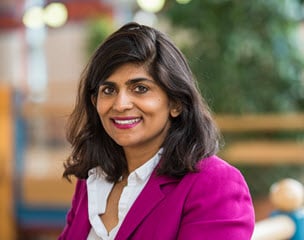Day in the life of...Sadia Cuthbert, Head of Business Development at Cambridge Judge Business School since 2014.
We caught up with Sadia to find out how her role allows her to work with students and companies alike and the joys of seeing impactful collaborations come to life.
Please describe your job. What does the Head of Business Development at Cambridge Judge Business School do?
I’ve got the most amazing job here. I get to work with companies from all over the world (big and small), with a great team of people and of course I get to work closely with our amazing students.
To be more precise, I have an external facing role specifically for the MBA Programme. During the one year intense Cambridge MBA Programme students work on two or three projects with external companies, something we have always done and, based on feedback, something we do rather well. My team works with companies sourcing projects (everything from local start-up and international MNCs), deepening existing employer links and developing new connections for student recruitment, and working closely with other research initiatives and Centres at the Business School.
What skills do you need to be effective in your role?
Having worked in finance and development consulting and been immersed in the Cambridge entrepreneurial network, I think I understand business. My contribution is spotting the opportunities and joining the dots. To do that, you need to be a good communicator, a bit of a problem solver and prepared for the difficult conversations.
Tell us about a typical working day?
I know this must be a common response, but there really is no typical day for me; of course as your readers will know, there is a lot of emailing involved! There are many different ways the Business School engages with companies and I get involved in quite a few of these collaborations.
The MBA Programme timeline is very intense. Delivering projects that I have already mentioned involves initiatives at several levels. I enjoy participating in company recruitment events on campus and get involved with treks to marketing wherever possible.
We also have theme oriented events across the Business School. We work closely with industry and academic experts to provide insights into shifts in industry wide business practices, governance, organizational change. Understanding the global landscape is of huge benefit of our students, alumni and collaborators. These have a very wide appeal.
Out of term, there is a bit more reflective time which allows for fresh ideas, planning and developing new links with businesses. This is also a good time to meet new students at fairs and talk about the opportunities our MBA has to offer. There is always a lot on!
What do you find most rewarding about your role?
For me, the thing that gives me the biggest buzz is seeing a collaboration come to life. In the case of projects this can be when students come up with genuinely new and unexpected ideas with impact on the company or better still are transformational or even a lightbulb moment for the students themselves. We have a lot entrepreneurial activity at the Business School which is very stimulating and helping our start-ups grow gives me a huge thrill.
What don’t you like about your job?
As with any business development role, the job is never complete. There is always more to be done and I find it difficult to switch off.
What are the most popular markets students wish to explore through projects and why?
Private equity and social impact investing of course! The idea of value creation and having a beneficial social impact is very appealing to this generation. These sectors invariably have high barriers to entry for experienced candidates and Projects allow our students to get a peek into what it’s like. Although these may be the most popular, the diverse nature of our cohort means that interests vary widely from start-ups to large MNCs, from London to Costa Rica, luxury cars to NGOs.
Can you describe a project that’s been impactful for the company concerned?
One on-going project in Bangladesh is with BRAC which is the largest development organization in the world, which can have large scale impact. We are hoping to help BRAC in general, and one of its critical programmes in particular, address the crucial existential challenges faced by all such NGOs around financially sustainable and independence but doing this at scale.
Other broad examples of business impact are when students help companies reduce inefficiencies, enter new markets, expand product portfolios and develop strategies for important business decisions for companies which impact their bottom line.
What advice do you have for people who want to work in business development?
To be effective in Business Development you have be passionate and believe in what you are doing. But you also need to be aware that trust takes time to develop.
If you'd like your profile or a colleague's profile featured in the next Day in the life, please email us at tpeswani@gmac.com
